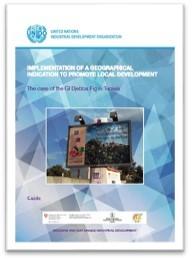New guide on valorizing geographical indications
The collective promotion of typical food products through geographical indications (GIs) can have a significant impact on rural economic development. More and more countries are registering geographical indications (GIs). However, the experience shows that registered GIs are in many cases not effectively used by producers.
UNIDO has published a guidebook that presents step by step the working methodology, which was adopted by UNIDO to promote a Tunisian GI product. The lessons learned can help producers in different regions to implement GIs that have been legally granted, but that have remained commercially unexploited.
The guidebook is the result of several years of UNIDO technical assistance to support producers in the North-West of Tunisia to implement and promote the first Tunisian GI for a fruit - the Djebba Fig. The UNIDO project “Projet d’accès aux marchés des produits agroalimentaires et de terroir” (PAMPAT)”, funded by the State Secretariat for Economic Affairs (SECO) of the Swiss Confederation, was launched in 2013. The project aims at improving the performance, market access and socio-economic conditions of harissa, the Djebba fig and the prickly pear value chains in Tunisia. At the beginning of the project, there were no farmers in the mountain village Djebba selling figs with the GI label, the GI concept itself was unknown to Tunisian consumers and the typical fruit was not valorized by the local community.
The intervention strategy of the project, which covered twelve main working areas presented in the guide, took into consideration that income-generation could stem from sales of the flagship product itself, as well as from the introduction of other related economic activities such as agri-tourism, cultural festivals, gastronomy, and development of new products around the GI Djebba fig. At project end, 25% of local fig production was certified with the GI, fig prices in Djebba had doubled, and GI figs were sold to supermarket chains and exported to the Gulf countries and Canada. Furthermore, processed fig products were being marketed outside of the agricultural season and the number of tourists visiting Djebba had increased by 150%.
Read the Guide here.
Watch the video here.
For further information contact Fabio Russo (F.Russo [at] unido.org (F[dot]Russo[at]unido[dot]org))

